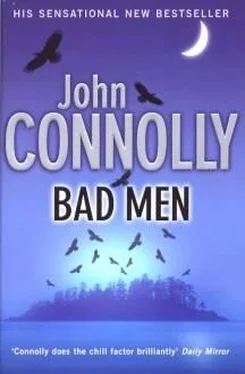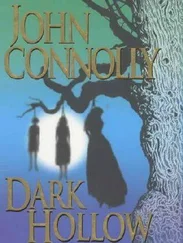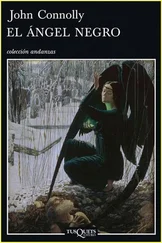It took Powell only minutes to half climb, half slide his way down the slope to the rocky beach. When he reached the bottom, he was breathing heavily, and his hands stung from the cold. His finger was almost numb as he inserted it beneath the trigger guard. He advanced to the shoreline and raised the gun, resting its barrel against his forearm.
The man with the arrow through his torso stood in the water. The sea was just below the level of his chest, but the waves that billowed against him had no effect. He remained entirely still, his orange jacket glowing luminously in the faint light that somehow contrived to penetrate the dense clouds above. Powell could even see the point of the arrow, gleaming, just above the water.
He’s dead, thought Powell. He’s dead, but he’s just too dumb to realize it. He’s like a dinosaur, waiting for the message to penetrate to his brain. Well, I’ll help it along. I’ve got an express delivery for him, going straight to his head.
Powell sighted, then squeezed off two shots in quick succession and watched in satisfaction as twin puffs of red sprang from the breast of the figure among the waves.
The man didn’t fall.
Powell lowered the gun and waited. It appeared to him that the injured man had drawn closer to the shore. It looked like he had moved forward a clear five feet or more, as the water was now approaching the level of his navel. Powell took aim again and emptied the clip into the injured man. He thought he saw him buck slightly at the impact of the bullets, but that was the only sign Powell got that he had struck home.
He ejected the empty clip, replaced it, then advanced into the sea. The cold was intense, but he shrugged it away. Instead he concentrated on the head of the man, moving toward him steadily despite the waves, and with every step he took he fired a shot. The last one struck the top of the guy’s head when Powell was barely five feet away. His chin lay against his chest, and no movement came from him. Powell could see the wounds left by the bullets, could even see something white glistening through a hole in the man’s skull.
He’s dead now, Powell told himself. There’s something holding him in place-soft sand, maybe, or rocks, or even the remains of a boat-but he’s dead for sure. Whatever is anchoring him there, it sure as hell isn’t free will.
At that moment, Powell became aware of a presence to his rear. He looked back to see a boy watching him from the shore. The boy’s clothing looked dated, and the waves worshiped at his bare feet. His skin was pale and he held his hand to his throat, as if remembering some ancient hurt. Powell was about to speak to him when the dead man in the sea raised his head, a sharp clicking noise in his throat alerting the gunman to the movement. Powell slowly turned to face him, then rocked back on his heels, trying to steady himself against the twin impacts of shock and water. It was the dummy, but not the dummy. The distortion in his face-the drooping mouth, the too-wide eyes, the sheer strangeness of his features’ composition-was now gone, and the man before him was, well, handsome, and his eyes gleamed with newfound intelligence.
Powell fumbled for a new clip, but the coldness and the damp caused his fingers to betray him and the clip slipped from his grasp and dropped into the sea with a soft splash. He looked down to follow its progress, then raised his eyes in time to see a huge wave rising up behind the dead man who stood before him. It lifted him off his feet and propelled him at speed toward Powell, his body riding the crest, carried forward like a piece of driftwood before it slammed into the gunman. Powell screamed as he felt the point of the arrow enter his chest, the dead man’s arms enveloping him, his face pressed hard against Powell’s, his mouth twisted into a smile.
The wave broke over them and they disappeared beneath the sea.
Carl Lubey’s home was already engulfed in flames by the time Macy reached it. She had seen the smoke rising and had smelled it on the wind, which caused her to speed up her progress toward the house. She made a couple of halfhearted efforts to get close to the front door, then gave up as the heat forced her back. Her main concern was the possibility that the fire might reach the forest, but Lubey had cleared his land of trees in order to allow space for his garden, thereby creating a natural firebreak. With luck, the break, combined with the heavily falling snow, would be enough to contain the conflagration. But somebody needed to be told about it, just in case.
Macy took the radio from her belt and tried, for the third time since she’d left her vehicle, to raise someone on the system. On the first two occasions, the radio had been dead, clicking emptily just like the ignition in the car. Now, as she stood within sight of Lubey’s burning home, she could hear static. She brought the handset close to her mouth and spoke.
“This is Macy. Do you read me? Over.”
She tried again, using her call sign. “This is six-nine-one. Over.”
Static, nothing more. She was about to replace the handset when its tone changed. Slowly, she raised the radio to her ear and listened.
It wasn’t static now. Perhaps it had never been. It seemed to her that what she was hearing was an irregular hissing sound, like someone constantly adjusting escaping gas. She listened harder, and thought she distinguished patterns and pauses, a kind of cadence.
Not static, and not hissing.
But whispers.
At the edge of the forest, Moloch and his men watched the sky glow above the tips of the trees. Their flashlights were dead and now, as they paused before the distant conflagration, Dexter took the opportunity to change the batteries, using the spares in his pack. Nothing happened. The flashlight remained dark.
“Those batteries were fresh from the store,” said Dexter. Scarfe tried changing the batteries in his own flashlight, and found that it too remained dead.
“Bad batch,” he said. “Looks like we’re shit out of luck.”
He took his Zippo from the pocket of his jacket, lit it, then held it close to the map. His finger pointed to details.
“I figure we’re here. Best I can reckon it, Carl’s house is over there.”
He raised his hand and pointed toward the flames.
“Since his place is the only one in that section of the island, that means-”
Dexter finished the sentence for him.
“That either we got a forest fire, which don’t seem likely, or right now Lubey’s house is just about the warmest place to be on this island. Explains why he didn’t make it to the rendezvous. A man’s likely to be distracted if his house is burning down around his ears.”
“People will come,” said Scarfe. “The cops run the fire department. Dupree will be here soon.”
“I don’t think so,” said Moloch, interrupting for the first time. He regarded Scarfe for a moment, until the smaller man’s mouth gaped in understanding and he looked away.
Moloch traced his finger across the woods on the map.
“We keep going, then take a look at what’s going on from cover. We need Lubey’s truck if we’re going to get out of here ahead of the cops. The fire will be our marker.”
Dupree was looking to the east, where a faint red glow hovered above the trees. Larry Amerling stood beside him. The old postmaster’s house was nearest the station and he had heard the gunfire. Dupree had almost turned his gun on him, for Braun had headed into the forest only moments before and Dupree had been about to follow him when the postmaster had intervened. Amerling took a look at the body of the woman in the generator room. He emerged pale and gulping cold air.
“We need to get some men over to that fire,” said Dupree, “but there’s at least one armed man out there, and probably more.”
Читать дальше












